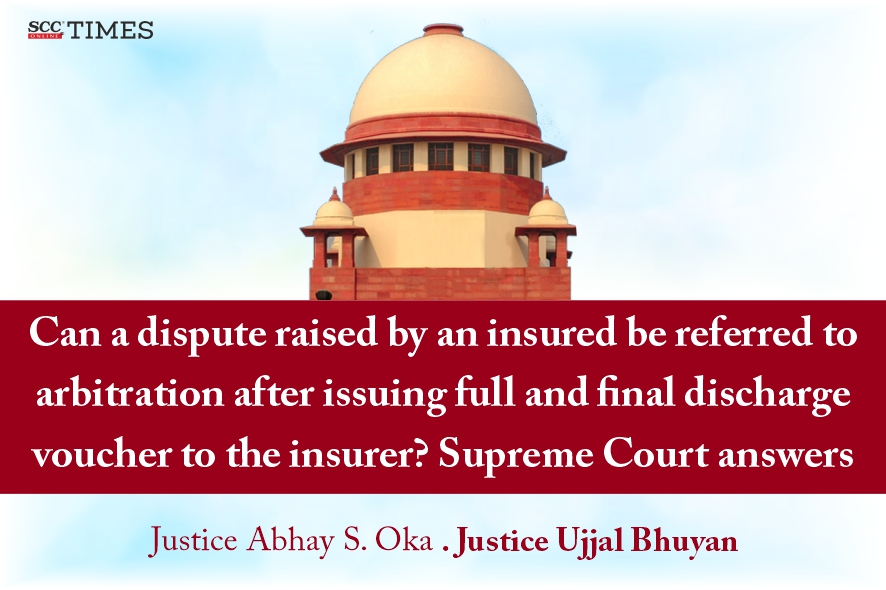Supreme Court: In an appeal filed against the order passed by the Bombay High Court, concerning the issue that whether a dispute raised by an insured after giving a full and final discharge voucher to the insurer can be referred to arbitration, the division bench of Abhay S. Oka and Ujjal Bhuyan*, JJ. held that the High Court had erred in rejecting the appellant’s applications under Section 11(6) of the Arbitration and Conciliation Act, 1996 (‘1996 Act’). The Court observed that the question of whether the appellant was compelled to sign the standardized voucher/advance receipt sent by the respondent under economic duress, and whether the claim to arbitration was sustainable despite the receipt of Rs. 1,88,14,146.00 against a total claim of Rs. 5,71,69,554.00, fell squarely within the domain of the arbitral tribunal.
Accordingly, the impugned order of the High Court was set aside.
Background
Appellant was a company incorporated under the provisions of the Companies Act, 1956. It is engaged in the business of exporting meat and meat products. The appellant took a comprehensive Standard Fire and Special Perils Policy from the respondent, insuring its meat processing and cold storage unit, along with the factory building, plant and machinery, furniture, and fixtures at Taloja for an amount of Rs. 3,28,55,000.00 for the period from 09-10-2004 to 03-10-2005. In addition, the appellant took a Fire Declaration Policy insuring all its stock-in-trade and finished products stored at the cold storage facility at Taloja for an amount of Rs. 5,76,85,000.00, covering the period from 15-03-2005 to 15-03-2006.
The appellant informed the respondent about the incident on 29-07-2005, requesting a surveyor to assess the damage. The appellant claimed a loss of Rs. 56,07,027.00 for damage to the plant and machinery and Rs. 5,15,62,527.00 for damage to the stock under the two policies.
On 26-07-2005, Taloja experienced very heavy rainfall, causing the factory premises to be submerged under water for several hours. The appellant suffered significant damage to the factory building, plant and machinery, furniture, and stock in the cold storage facility. Despite repeated reminders from the appellant, the respondent failed to settle the claims. Eventually, in December 2008, the respondent presented an undated, standardized voucher/advance receipt for Rs. 1,88,14,146.00, which the appellant had no choice but to sign due to financial pressure. The appellant received a cheque for the said amount on 19-12-2008. The appellant, while reserving its right to invoke the arbitration clause, requested the respondent to settle the remaining amount of Rs. 3,83,55,408.00, which was the difference between the amount claimed and the amount paid.
Both insurance policies contained identical arbitration clauses. On 24-12-2008, the appellant invoked the arbitration clause, requesting the respondent to appoint an arbitrator to resolve the dispute.
However, the respondent, by letter dated 12-10-2009, informed the appellant that it was not agreeable to referring the matter to arbitration, contending that the appellant had accepted the amount offered in full and final settlement, constituting an ‘accord and satisfaction’. Thereafter that the appellant approached the High Court by filing applications under Section 11 of the Arbitration and Conciliation Act, 1996.
The Single Judge, by the impugned order, observed that the amount offered by the respondent had been accepted by the appellant in full and final settlement of its claim. The acceptance had not been made under protest, nor had it been stated to be without prejudice to the rights and contentions of the appellant. The payment was made on 19-12-2008 and was accepted by the appellant without any objection. After encashing the cheque, the appellant raised the dispute only on 24-12-2008. The Single Judge referred to one of his previous decisions, where he had taken the view that if a receipt is issued accepting payment in full and final settlement, then no dispute could subsequently be raised. Accordingly, he held that no arbitrator could be appointed in view of the acceptance of the amount as full and final settlement.
Analysis and Decision
The Court noted that in Nathani Steels Ltd. v Associated Constructions, 1995 Supp (3) SCC 324, the Court held that once parties had reached a settlement in respect of any dispute or difference arising under a contract, and that dispute or difference had been amicably resolved through a final settlement between the parties, then, unless that settlement was set aside in proper proceedings, it would not be open for one of the parties to reject the settlement on the ground of mistake and subsequently invoke the arbitration clause.
The Bench clarified that unless the settlement was duly set aside through appropriate legal proceedings, arbitration could not be invoked. However, it was also pointed out that this view was taken in the context of an amicable settlement, one arrived at between the parties in the presence of a third party and formally reduced to writing. Thus, the Court emphasised that the operative term was “amicable settlement”.
After referring to Vidya Drolia v. Durga Trading Corporation, (2021) 2 SCC 1 and Oriental Insurance Company Ltd. v. Dicitex Furnishing Ltd, (2020) 4 SCC 621, the Court noted that at the stage of Section 11(6) of the 1996 Act, court is required to ensure that an arbitrable dispute exist; it has to be prima facie convinced about the genuineness or credibility of the plea of coercion; it cannot be too particular about the nature of the plea which naturally has to be made and established in the arbitral proceeding. If the courts were to take a contrary approach, there would be the danger of denying a forum to the claimant altogether.
Further, noting that the doctrine of Kompetenz-Kompetenz was now firmly embedded in Indian arbitration jurisprudence, the Court highlighted that tis doctrine was based on the principle that an arbitral tribunal had the competence to rule on its own jurisdiction, including issues concerning the existence or validity of an arbitration agreement. The underlying objective of the doctrine was to minimize judicial intervention, reflecting a broader recognition of the concept of party autonomy in arbitration proceedings.
In view of the clear legal proposition, the Court held that the High Court had erred in rejecting the appellant’s applications under Section 11(6) of the 1996 Act. The Court observed that the question of whether the appellant was compelled to sign the standardized voucher/advance receipt sent by the respondent under economic duress, and whether the claim to arbitration was sustainable despite the receipt of Rs. 1,88,14,146.00 against a total claim of Rs. 5,71,69,554.00, fell squarely within the domain of the arbitral tribunal.
Accordingly, the impugned order of the High Court was set aside.
Having regard to the long lapse of time, the Court observed that it would be appropriate to appoint a retired Judge of the Bombay High Court as the sole arbitrator. Accordingly, the Court appointed Justice (Retd.) Suresh Chandrakant Gupte as the sole arbitrator. The parties were directed to report before the sole arbitrator by 15-05-2025.
CASE DETAILS
|
Citation: Appellants : Respondents : |
Advocates who appeared in this case For Petitioner(s): For Respondent(s): |
CORAM :





